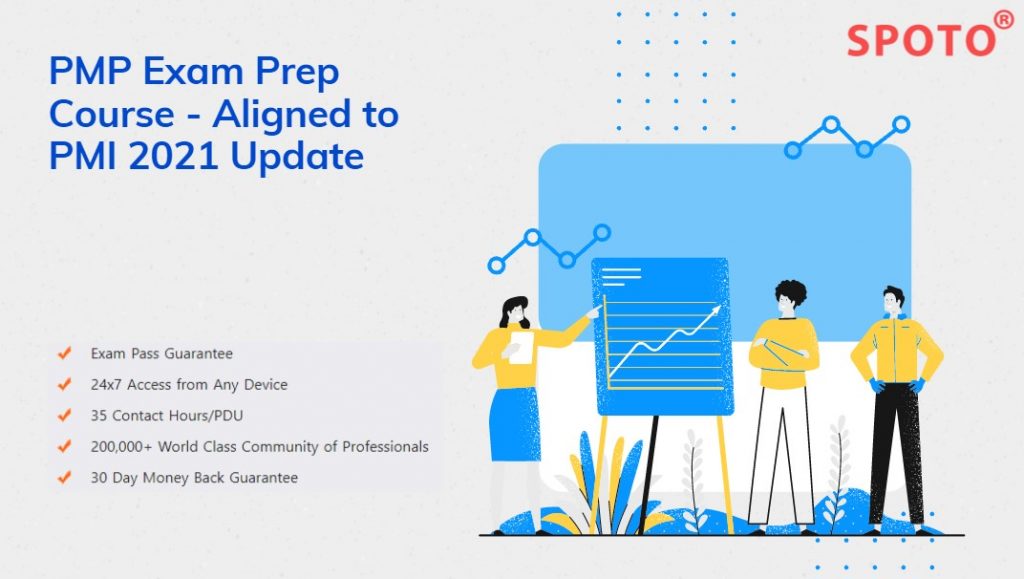PMP® is an abbreviation for Project Management Professional, and it refers to the certificate that is awarded to anyone who passes the PMP certification exam. So, if you pass the PMP exam, you will be a Project Management Professional (PMP).
The PMP certification is the most widely recognized Individual certification in the field of project management, and it is highly valued around the world. In some cases, it is a required qualification for a project management position. A PMP-certified project manager can work as a project manager in any industry, anywhere in the world.
Prerequisites for the PMP Exam
Anyone who meets the prerequisites can take the PMP exam.
Individuals with a Bachelor’s degree must be able to provide documentation demonstrating at least 4,500 hours of project leadership and management experience, as well as 35 hours of formal project management training provided by PMI chapters or accredited Registered Education Providers (REPs). You can also review self-study books published by R.E.P.s and other reputable training organizations, according to the PMI.
Individuals with a high school diploma must be able to provide documentation demonstrating at least 7,500 hours of project leadership and management experience, as well as 35 hours of formal project management training provided by PMI chapters or accredited REPs. You can also review self-study books published by R.E.P.s and other reputable training organizations, according to the PMI.
Concerning the PMP Exam
The PMP exam is a four-hour examination with 200 questions. Twenty-five of the 200 questions are not scored. However, you won’t know which 25 questions aren’t scored until the test is over, so make sure to take all of them seriously. The PMI® includes these questions to determine how many test takers get them correct. Based on the results, they may decide to include these questions in future exams—similar it’s to a survey conducted by the PMI to help the PMP exam produce the highest quality professionals.
To pass the PMP exam, you must answer 141 or more questions correctly out of 175 total, which equates to 81 percent. As you might expect, the PMP exam is not easy. You are correct!
Syllabus for the PMP Exam
How does the PMP exam go? The PMI describes the proportion of questions in each domain that will appear on the PMP exam in the table below.
You’ll be asked questions about each domain to assess your knowledge and skills needed to perform a variety of tasks, which are described below.
The following knowledge and skills are required to answer questions in the Initiating Domain.
Analytical abilities
Techniques for Benefit Analysis
A project charter’s components
Techniques and tools for estimating
Strategic leadership
Planning-related Questions The following knowledge and skills are required.
Planning for Change Management
Planning for cost management
Techniques and tools for project budgeting
Contract types and selection criteria for communications planning
Techniques and tools for estimating
Human resource management
Principles of lean and efficiency
Planning for procurement
Planning for quality management
Planning for gathering requirements
Tools and techniques for scope deconstruction (WBS, Scope backlog)
Planning for scope management
Planning for stakeholder management
Time management planning, including tools and techniques for scheduling
Techniques for drawing workflow diagrams
Execution-Related Questions The following knowledge and skills are required.

Processes of continuous improvement
Techniques for Contract Management
Elements of a work statement
Interdependence with project components
Techniques and tools for project budgeting
Tools of high quality
Techniques for Vendor Management
Concerns in the Domain of Monitoring and Control The following knowledge and skills are required.
Techniques for performance management and tracking (EV, PERT, CPM, Trend Analysis)
Techniques for Process Analysis (Lean, Kanban, Six Sigma)
Tolerances and project control thresholds
Principles of project financing
Techniques and tools for project monitoring
Best practices and standards for project quality (BS, CMMI, IEEE, ISO)
Tools for measuring quality (statistical sampling, control charts, flowcharting, inspection, assessment)
Techniques for identifying and analyzing risks
Techniques for quality validation and verification
Inquiries in the Closing Domain The following knowledge and skills are required.
Statutes and practices for archiving
Contract requirements for contract closure
Procedures for closing out
Techniques for providing feedback
Techniques for measuring performance (KPI, key success factors)
Techniques for project evaluation
Technique for Transition Planning
Checklist for PMP Exam Preparation
The PMI recommends the following tips to help you prepare for the PMP exam:
Examine the PMP handbook.
Examine the most recent PMP Exam Content Outline.
Examine a number of PMP Test Sample Questions.
Completing formal project management training and studying the PMBOK Guide





